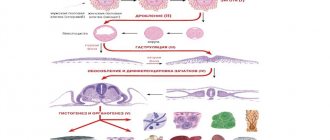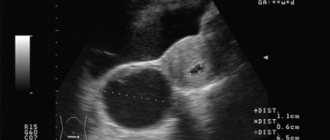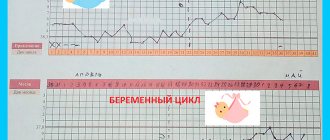Carrying a baby does not always proceed easily and without deviations. The first weeks of pregnancy are especially dangerous, when the baby has just established itself in the woman’s womb. The most dangerous condition is the threat of pregnancy failure. Rejection of the embryo (in the early stages) or placental abruption (in the later stages) from the uterine wall is accompanied by vascular damage. The result is bloody discharge. Uterine bleeding can be of varying intensity. Having assessed the pregnant woman’s condition, the doctor often decides to prescribe hemostatic drugs. This category also includes a medicine such as Etamzilat. Is it safe to use while pregnant? Will he help cope with the problem that has arisen?
Causes and symptoms of bleeding during early pregnancy
Bleeding can be either weak, spotting, or quite strong and profuse; in the first trimester of pregnancy, it occurs in 20-30% of women . Each type of bleeding during pregnancy has its own causes and symptoms.
Implantation bleeding early in pregnancy. Symptoms – a small amount of discharge streaked with blood during pregnancy. Their reason is the attachment of the fertilized egg to the uterine wall. During this process, damage to blood vessels can occur, which is what causes the discharge.
How to distinguish periods from implantation bleeding during pregnancy? Such bleeding sometimes resembles weak periods (lasts 1-2 days) and comes at the same time as them, which leads to confusion in determining the start date of pregnancy. Typically, implantation bleeding is considered one of the first signs of pregnancy.
Damage to the uterine os. With strong physical exertion, as well as careless sexual intercourse, damage to the lining of the uterine pharynx can occur, which leads to bleeding. It is painless and usually goes away within 4-6 hours. Damage to the uterine pharynx is perhaps the most common cause of bleeding.
Reduced levels of pregnancy hormone in the body. It happens that the ovaries may not produce enough progesterone, then the body begins to “think” that it is time to start the process leading to menstruation. The mucous membrane of the uterus begins to peel off, and it bleeds, as during menstruation.
With a lack of progesterone, the attachment of the fertilized egg to the wall of the uterus may be significantly impaired, and the process of placenta formation may also be inhibited. The intensity of bleeding can vary from barely noticeable to quite heavy. Such bleeding is most often observed in women who have been treated for infertility, as well as those who have an irregular menstrual cycle.
Breakthrough bleeding. The reason for such bleeding during early pregnancy is the so-called hormonal breakthrough due to a strong change in the hormonal background of the expectant mother. It looks like menstruation, which is often confused with it. It happens both in the first month of the “position” and within 3-4 months after the onset of pregnancy. Most often it is not dangerous.
Miscarriage or threatened miscarriage. 50-60% of all bleeding is a threat of miscarriage, that is, miscarriage. The first signs are pain resembling contractions and bloody discharge from the vagina. At the same time, the embryo is still “clinging to life,” that is, to the walls of the uterus, but how the pregnancy will proceed, whether the woman will be able to bear this child is an open question. The causes of threatened miscarriage are most often various infections, injuries, and dehydration.
Sometimes such symptoms are a sign of a miscarriage that has already occurred. The abdominal pain subsides, the bleeding stops, and the embryo is no longer visible on the ultrasound. The cause of miscarriage is usually the same - infection, injury, dehydration or taking certain medications. Also common causes of miscarriage are abnormal fetal development and various genetic disorders.
If a miscarriage seems to have occurred, but the bleeding does not stop and is accompanied by the discharge of blood clots and tissue, this means that the miscarriage is incomplete. The embryo has already died, and there is no chance of saving the pregnancy in this case.
Ectopic pregnancy. It happens that the fertilized egg, instead of attaching to the wall inside the uterus, remains in the fallopian tube, where it begins to develop safely. The cause of ectopic pregnancy is usually adhesions in the oviduct, inflammatory processes in the ovaries and the use of IUDs as contraceptives.
The development of this pathology is dangerous for the health and sometimes even the life of a woman, because as the fetus develops and increases in size, it can rupture the fallopian tube, which leads to hemorrhages in the abdominal cavity. Signs of an ectopic pregnancy are abdominal pain, most often on one side of the body, and spotting. Treatment is carried out only by surgery.
Frozen pregnancy. The reason is deviations in the development of the embryo, most often genetic. A frozen pregnancy may not have any special symptoms, with the exception of spotting from the genitals and abdominal pain. Naturally, there can be no talk of any birth - the fetus died.
Placental abruption. In this case, bleeding occurs due to the gradual detachment of the placenta from the wall of the uterus and the accumulation of blood in the space between them. The placenta can exfoliate for various reasons: disorders in the vascular system, heart and kidney disease, obesity, malformations of the uterus, and so on. Sometimes placental abruption occurs in women who are preparing to become mothers for more than the first time. Symptoms are bleeding and pain. Placental abruption can lead to the loss of the baby.
Infections or erosion. If the cause of bleeding is cervical erosion, then you don’t have to worry too much - it does not affect the course of pregnancy and its outcome. It usually does not cause any inconvenience to the expectant mother, so it does not need to be treated during pregnancy.
If the cause of bleeding is an infection, then you will have to be treated in any case, because it can have a strong negative impact on the development of the baby, kill him or cause a miscarriage.
How to stop bleeding at home: tablets and folk remedies
Of course, in these emergency circumstances, the first thing to do is to seek medical help and consult a specialist.
But if it is not possible to call an ambulance, if a visit to a doctor is impossible, the woman needs to know the list of hemostatic agents that can be used in this condition.
For minor blood loss
Minor bleeding may have natural causes and therefore does not require special medications. Sometimes it is enough to get by with some folk remedies.
- water pepper extract - promotes blood clotting and stops blood loss;
- Lagochilus tincture - increases the rate of blood clotting;
- calcium chloride - administered intravenously and contains calcium, which is involved in the coagulation process;
- “Vikasol” or vitamin K is a substance necessary for the liver to synthesize proteins that promote blood clotting. Release form - both in injections and tablets;
- "Dicinon" in the form of hemostatic tablets stops blood loss approximately three hours after administration.
What to do if there are heavy leaks
If the blood loss is significant, you need to urgently call an ambulance and take the following medications while the car is driving:
- "Contrical" is administered intravenously for heavy bleeding.
- “Tugina” has the same effect as “Kontrikal”, but is in the form of tablets, so it is more convenient to take at home.
- "Dicinone" in injections is well suited for severe uterine bleeding, as it promotes rapid blood clotting.
- "Tranexam" - a very strong drug for extreme cases, in tablet form. You need to take 6 pieces at a time.
- "Trenaxa" - the same action as the previous drugs, is well suited for use for any bleeding during pregnancy.
Separately about the importance of examination by a doctor
An unsuitable product can harm both the child and the woman herself. Self-administration of medications is allowed only if it is not possible to go to the hospital or call an ambulance in the near future.
In this case, such an act is due to the impending threat to life and the lack of opportunity to receive qualified medical care.
However, if your condition is not so critical and you can drive to the nearest hospital or call an ambulance, you should do so. The doctor will determine the cause of the bleeding and prescribe the correct treatment.
To avoid negative consequences, the prescription of hemostatic drugs for uterine bleeding should be carried out only by a qualified gynecologist.
What to do if you have bleeding in the first trimester of pregnancy
If you find bloody discharge on your underwear, you should take all measures to prevent it:
- First of all, do not panic and consult a doctor . The gynecologist will be able to accurately diagnose using various research methods and, if necessary, prescribe the necessary treatment aimed at saving the pregnancy. Moreover, some types of bleeding pose a danger to the expectant mother herself, and they should not be neglected.
- If you experience heavy bleeding during pregnancy, call an ambulance and lie down. You should avoid “traveling” to the hospital on your own - it is best if a doctor comes to your home.
- After visiting a doctor, be sure to follow all his recommendations , take care of your nerves if possible and reduce heavy physical activity.
- If you are offered to stay in hospital , listen to this practical advice if you want to preserve your pregnancy and your health.
How they do it
A hot injection into a vein is a rather complex procedure that requires skills from a medical professional.
Otherwise, additional therapy may be required to eliminate the consequences. Such injections can only be given intravenously. If the product gets under the skin, it will cause necrosis of the subcutaneous fat. The injection syringe must have a small diameter.
Preparation
No preparatory procedures are required before disposing of the fetus using medications. The only condition is to limit food intake on the day of the procedure.
Abortion by injection is carried out only after the patient has undergone examination and in the absence of individual contraindications.
Giving an injection
The main condition when administering an injection is to administer the drug very slowly, otherwise you can injure the vein wall.
You can administer the product in 3 ways:
- Jet (regular injection).
- Drip (classic drip).
- Electrophoresis (the product enters due to current discharges).
If the injection is given quickly, fainting is possible. If the patient suffers from hypotension (low blood pressure) and a tendency to lose consciousness, then the healthcare worker should be warned about this. In this case, the medicine will be administered within 4-5 minutes.
After interruption
The rehabilitation period plays a serious role. Not only the patient’s health, but also her reproductive ability in the future depends on recovery.
Chemical abortion has few complications compared to surgical abortion, but it is advisable to minimize them.
- avoid sexual intercourse for 30 days to prevent infection of the uterine cavity;
- avoid physical overexertion, postpone sports activities;
- strictly observe hygiene requirements, wash yourself 3 times a day with a light solution of potassium permanganate;
- Change underwear daily and sanitary pads several times during the day.
After a miscarriage, you need to visit a gynecologist for a preventive examination. Do an ultrasound of the pelvic organs within six months.
If a woman experiences mood swings or depression, a psychologist will help. You can take a light herbal sedative.
Prevention and general recommendations for bleeding
To reduce the risk of bleeding, as well as the risk of developing pathologies and disorders during pregnancy, you should follow several preventive recommendations:
- Plan your pregnancy . The more thoroughly you prepare for it, the better. Get a full examination of your body, cure inflammation and various infectious diseases of the genital tract.
- Walk outdoors more often , somewhere outside the city. The beauty of nature always has a positive effect on the psycho-emotional state of a woman, and clean air is full of oxygen, which is necessary for the proper development of the fetus.
- a positive emotional background around yourself , be calm and rejoice more often, even in small things.
- Give up bad habits - smoking and alcohol. Consume as much clean water as possible.
- Avoid taking medications once again, especially potent ones - they do not always have a positive effect on our body.
Video about bleeding during pregnancy
In the next video, which you can watch, lecturer Nana Kartlosovna Tetruashvili, within the framework of the IV scientific and practical conference “Miscarriage,” will talk in detail about all kinds of bleeding , as well as their causes.
Dear readers! After reading our article on bleeding in early pregnancy, you can discuss any questions you have in the comments. Share your stories and experiences, problems and ways to solve them, help each other, don’t be shy and ask questions. Moreover, everything in the article cannot be described in one fell swoop, and the experience of those who have already left behind the “bleeding horrors” will be useful to all expectant mothers.
When is spotting normal?
As soon as the fetus begins to develop in a woman’s womb, her body undergoes enormous changes and any unusual sensations make her very nervous, which will negatively affect the course of pregnancy, including bleeding in the early stages. Sometimes this phenomenon can be observed on those days when menstruation should occur, but due to the onset of pregnancy, they should no longer occur.
If bleeding in the early stages of pregnancy is not accompanied by painful sensations, then there is no reason for concern. In addition, minor bleeding due to the fact that the fertilized egg attaches to the wall of the uterus does not pose a danger to the fetus and mother. Simply put, you should not worry if about 7-9 days have passed since fertilization, the discharge itself is not abundant and is short-lived.
In medicine, this phenomenon is called “implantation of the fertilized egg.” This process is accompanied by “loosening” of the uterine mucosa and the development of new blood vessels. It looks like 1-2 drops of blood, but no more.
Of course, a woman should inform her doctor about the presence of any changes in the body, who, in turn, can establish the true reason why bleeding occurred in the first trimester of pregnancy and eliminate unnecessary anxiety on the part of the expectant mother.
Advice! If for some reason it is not possible to contact a healthcare professional in person, then inform him about your condition, at least by phone. And it will be easier for you after talking with your doctor and, if necessary, you will be able to solve the problem as quickly as possible.
It is worth understanding that during the period of fetal development, a woman’s body becomes especially sensitive to various kinds of external stimuli. For example, ordinary “daily products”, a familiar intimate product can already cause discomfort, itching and even a bloody “smear”.









